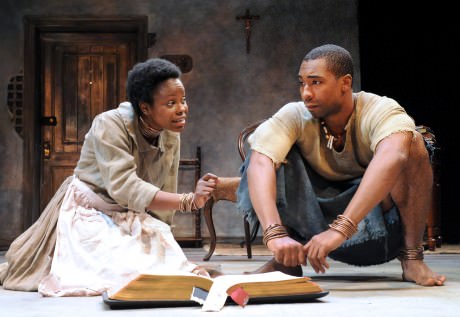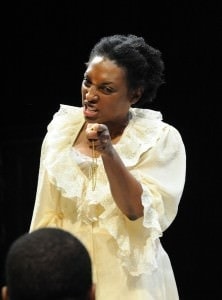Complex cultural and religious collisions come to a head at a play most befitting of Woolly Mammoth Theatre Company’s 33rd Season: My Roots, My Revolution. OBIE Award-winning playwright Danai Gurira brings to the stage her new work The Convert, a compelling drama set in 1895 amid the South African scramble for colonization. The escape of village life and the practices of non-Christian customs set against Catholic conversion make this drama a remarkably compelling ride that races to a dramatic conclusion the likes of which will stun the audience to the core. Directed by Michael John Garcès, the play unfolds in three acts and builds momentum every step of the way.

Set Designer Misha Kachman illustrates the less than posh interior of the learned man’s colonized home while created an edge of piety that displays his true nature. With weathered floorboards and a distinctly cement floor, the furnishings are sparse but refined, a reflection of Chilford’s rise in status. The enormous bible, the crucifix hanging on the wall and the overall drab interior are reminiscent of a convent or priest’s office. Kachman’s approach to the set ingrains the overall religious tone of the production into the atmosphere so that even in moments of doubt a reminder is never far out of view.
The real magic of this production comes from Sound Designer Ryan Rumery. Using a series of melodious percussion instruments to create jungle rhythms with sounds akin to the tribal music of the African rainforest, Rumery’s sound designs are slipped in to cover the shifts between scenes. Strong marimba sounds become enchanting, almost mimicking a rainstorm in a fashion as the play progresses and the occasionally Catholic church organ overbears the natural beauty of these more subtle orchestrations, reflecting the tones of the play in a simply beautiful fashion that is a delightful aural pleasure.
Director Michael John Garcès working with Dialect Coach Kim James Bey ensure an authenticity about the piece by instilling the proper sound to each of the characters. Bey incorporates a series of broken dialects into the English spoken by the main characters, showing their progression— in particular that of the leading female — from nothing but mimicry of the language to a full understanding of speech patterns, articulation and grammar usage. The harsh sounds of the native tongue used throughout the production are communicated effectively with extreme emotion so that although the audience may not understand the actual words, they are left with a sharp notion of the feelings attached to the spoken word.
The acting that springs forth from this production is a superior skill level of character development and deep understanding of cultural conflict. This cast of seven actors delves deep into their characters’ interiors, taking root with the raw emotions and beliefs written into the story and transforming them into powerful moments upon the stage. The sheer expressive force used by these actors is nothing short of stunning and makes three hours whiz by in a blur of events that will broaden the horizons of Cultural Revolution in the audience’s mind.
Native portrayals are depicted on varying levels in this production, from Jekesai (Nancy Moricette) when she is first snatched from her tribe, to Mai Tamba (Starla Benford) a woman who has been among the colonies a good deal longer. Moricette’s character early in the play sees the world through new eyes. Her uncertainty mingled with the curious nature to explore her strange new surrounding in Chilford’s office is a fascinating moment to watch. The way her body shies away from strange things — the light that does not come from the sun hanging above, and the cement floor that is not the dirt and earth her feet are used to; all wound up in this innocent naiveté that translates to minutely frightened. Benford’s approach to the native character is more assimilated whilst still maintaining a mischievous nature about her person. She poses as what is expected of her in her new societal arrangement while sneaking about and performing her rituals that are rooted deep within her character’s existence.
Uncle (Erik Kilpatrick) has a nasty bitter streak about his person; a sense of entitlement as an elder that is not easily subdued by the words of a much younger and more educated man. Kilpatrick takes on the difficult task of villainy masked through difference in this production; the playwright not intending for him to be a bad guy but his actions and words presenting him as such. His masterful balance of broken English gives him an authentic sound even when he’s at his angriest. Shouting in the native dialect, Kilpatrick gives stunning moments of pure rage that translate even to those that only speak English.
Tamba (JaBen Early) gives the audience the most physical portrayal of an African villager, loping about the stage in an animalistic fashion at times, especially during the scenes with Chancellor late at night. Early’s performance fits seamlessly into the blurred lines of what is culturally acceptable and what is not, creating a unique element in this production that motivates the action.
It is hard to imagine that a dynamic portrayal could come from a character that is non-committal and playing both sides of the coin, but Alvin Keith does just that with his role of Chancellor. At first he comes off as slightly pompous, but his character quickly delves into the wretched depths of unctuous sleaze; a vile snake lying wait in the grass. Keith appropriates spinelessness at the best of times, turning phrase to best suit his character’s needs, and his physical ability to become a limp noodle on the backward end of a bad whooping is no small feat.
Benford, as Mai Tamba, is a strong fierce woman, never wavering in her convictions. Placating the wishes of ‘the master’ often come as snips of comedy, like when she butchers her way through the ‘Hail Mary’ prayer. At other times her vocal fury is a force to be reckoned with. When thrown from Chilford’s house she’s downright terrifying, laying a pox upon his house using not only the deep boom of her voice but her entire physicality to do so. Benford proves in a scene with Moricette and Chilford (Irungu Mutu) that no matter what language is being spoken— grief, tragedy, and sorrow translate the same on the face, in the sounds of the words, and in the body.
In the case of ‘one of these things is not like the other’ Prudence (Dawn Ursula) fits the bill. From her character’s prim lace gloves and umbrella right down to her hoity-toity arrival, Ursula plays a British snob from on high. With all of the pristine English colloquialisms over enunciated and slightly haughty airs, you would believe as she believes that she is the smartest most educated person of them all. Ursula has a keen sense of comic timing and delivers her lines with a smarmy edge that leaves the audience laughing, but make no mistake when she falls into darkness its harrowing, a haunting moment that will set your soul on edge to see it.
Chilford (Irungu Mutu) is the epitome of cultural denial. Mutu plays the man who has found Jesus through Christian conversion, driving the overall theme of the play— religious salvation through conversion— with his stalwart approach to being saved. While his grammar may be tainted his articulation is perfection, making this character even more of an enigma as the play progresses. Mutu has moments of purely explosive exasperation and indignation, like being confronted about his sexual desires toward his protégé, and he also has moments of chilling and harrowing tension that radiate from the core of his being outward in waves like a crater landing in an otherwise still pond. His voice is his most expressive tool when it comes to translating his emotions from the text and the drastic climactic ending of this production weighs heavily upon his performance, which he executes with precision and great success.

Nancy Moricette is the most versatile of the performers. Previously mentioned in her more native character, she quickly transforms into ‘Esther’ the good Christian name given to her by Chilford. Watching her transformation throughout the production as she struggles to come to terms with how to live in this life removed from her own roots is riveting. She shares many of the play’s most intense moments — the scene between Esther and Mai Tamba chanting English prayers and tribal curses in one another’s faces comes to mind — and delivers each one with a breathtaking realistic blow that will knock the audience over. Moricette’s line in the story, despite being the central focal point, comes to a horrifically harrowing and shocking conclusion. Her performance is nothing less than phenomenal and she drives the show from the moment she arrives on the stage until the bitter end.
If nothing else The Convert teaches you that nothing— not religion, not politics, not any sort of bond — is thicker than blood. This pivotal moment in history makes you question your own religious beliefs at the end of the day and should not be missed.
Running Time: Approximately three hours with two intermissions.
The Convert plays through March 10, 2013 at Woolly Mammoth Theatre Company— 641 D Street NW in Washington, DC. For tickets, call the box office at (202) 393-3939, or purchase them online.




